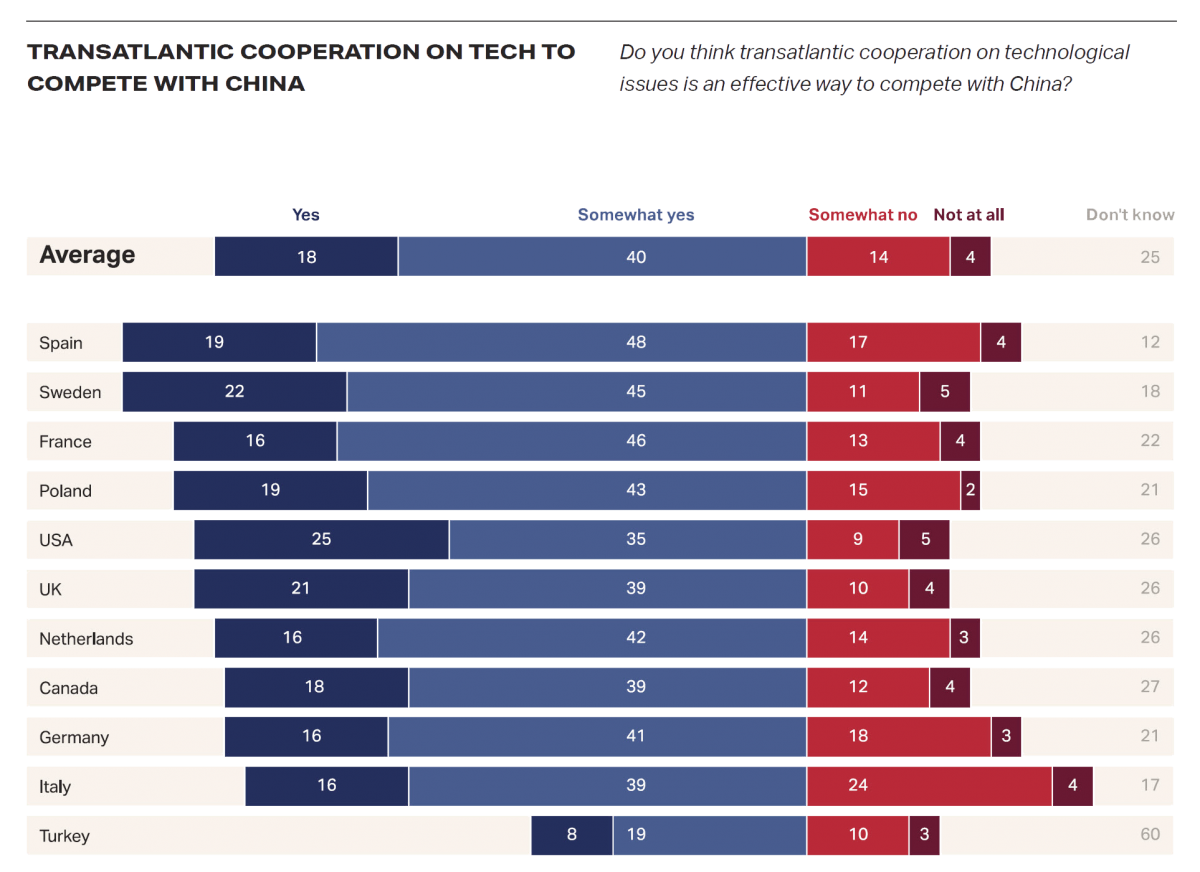Relations with China
Editor's Note: Read the full report, Transatlantic Trends 2021: Transatlantic Opinion on Global Challenges, available here.
HOW DO YOU FEEL ABOUT CHINA’S INFLUENCE IN GLOBAL AFFAIRS?
In all 11 countries covered by the survey, people feel generally negative about China’s influence in global affairs. Yet, there are signs this could change as Beijing’s influence is viewed more positively among younger respondents.
Especially since the outbreak of the coronavirus pandemic, China has been receiving growing attention on both sides of the Atlantic. It seems that China’s management of the pandemic has not benefited its image among Western populations. Across all countries in the survey, a plurality have a negative perception of Beijing’s influence in global affairs. However, the perception of China is a bit more positive in Turkey (34%), Poland (35%), and Italy (36%)—all countries that are part of China’s Belt and Road Initiative— and positive assessment reaches its peak in Spain (37%).
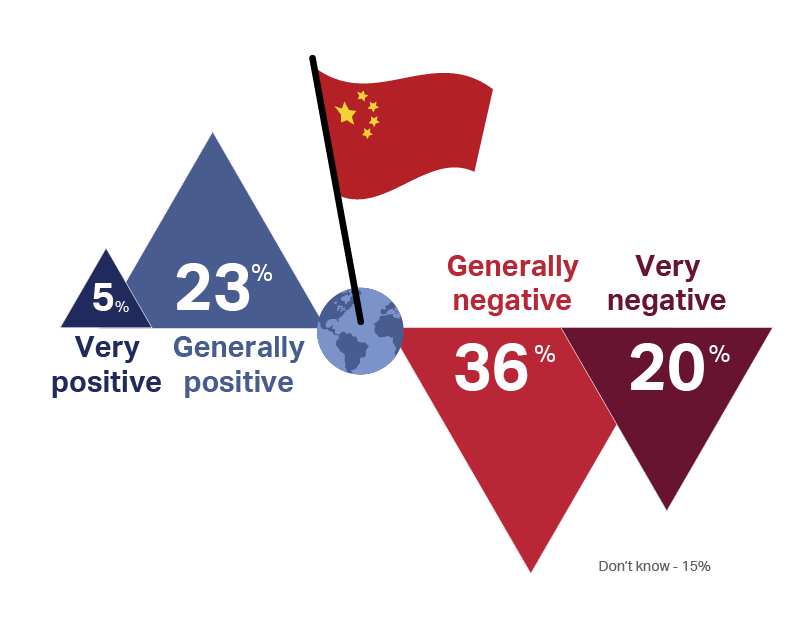
With almost two-thirds of respondents on average considering Beijing’s influence generally or very negative, Germans (67%), Canadians (63%), and Swedes (62%) have the most critical stance vis-à-vis China. In most other countries covered, over half (54-59%) of respondents had an either very or generally negative view of China’s influence.
How respondents perceive Beijing’s influence strongly varies with age: While a positive image of China prevailed particularly in the age group of respondents between 18 and 24, negative views of China increase with age. This might indicate a long-term change in public opinion on China over time across the Atlantic. While gender does not play a significant role, party affiliations affected views of China—though not along a consistent left-right spectrum across countries. Republican-leaning Americans (63%), supporters of the populist Five Star Movement in Italy (68%), Greens in Germany (81%), and the liberalconservative Moderaterna in Sweden (76%) have a more negative perception of China than their compatriots from other political parties.
Americans have the most divergent views. The number of respondents viewing China’s influence as “very positive” (12%) is highest among Americans, while the number with “very negative” views is also among the highest (23%). Americans also have the largest age gap. A striking 83% of Americans 55 and older view China’s influence as negative while among 18-24 year-olds only 39% view Beijing’s clout with skepticism.
SPOTLIGHT
The perception of China’s influence as mainly negative has barely changed in France and Germany compared to the post-pandemic results in 2020 (increase by 1 point in France and 6 in Germany). However, in the United States, China’s image improved significantly from 20% seeing China’s influence as positive in 2020 to 31% now, and this is even higher than the pre-pandemic level (29%). China’s image has improved across all age groups, but most strikingly among the 25-34 year-old (+15 points) and the 35- 44 year-old (+27 points) Americans.
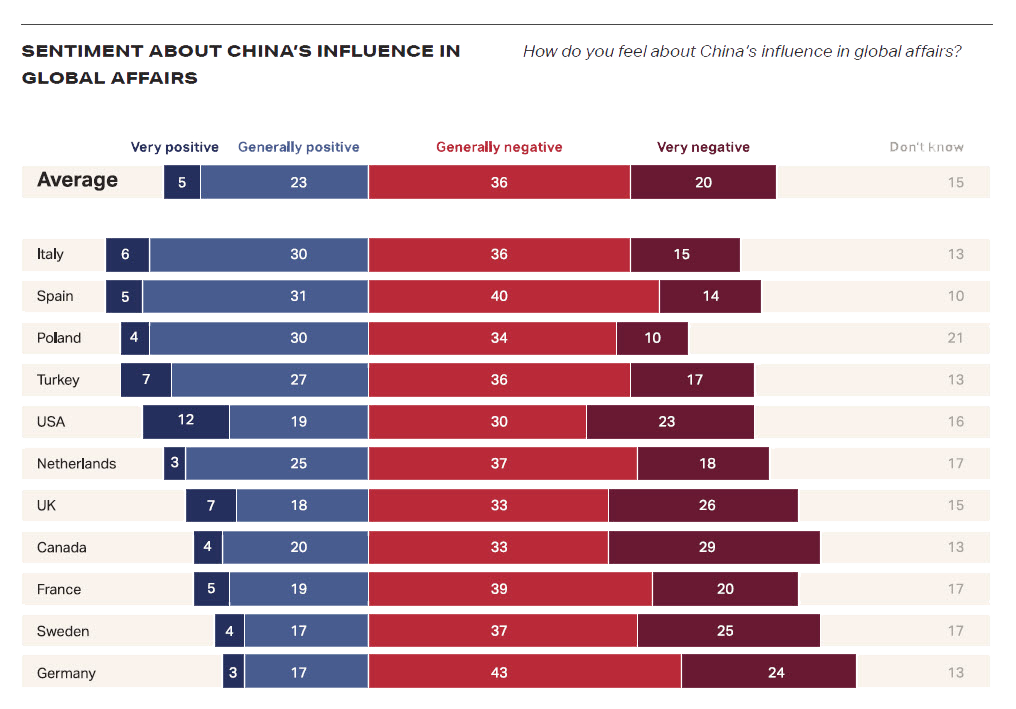
DO YOU PRIMARILY PERCEIVE CHINA AS A PARTNER OR A RIVAL?
China is considered “more a rival than a partner” by the majority in nine of the eleven countries surveyed. The perception of China as a rival prevails particularly in Canada, the United States, and western Europe.
In 2019, the European Commission labeled China “a negotiating partner, an economic competitor, and a systemic rival.” The ambiguity of this relationship is reflected in public opinion on bilateral relations of the countries surveyed with China. With the exception of the United States, where one in four respondents (26%) views China exclusively as a rival, very few respondents in other countries have such a distinct opinion. A majority of respondents in most of the countries surveyed label China “more a rival than a partner.” However, there is an important east-west and north-south divide on respondents’ perception of China: While China is primarily perceived as a rival in the U.S. (70%), France (62%), the UK (60%), and Canada (58%), China enjoys most favorable views as a partner in Spain (49%), Poland (45%), and Italy (36%).
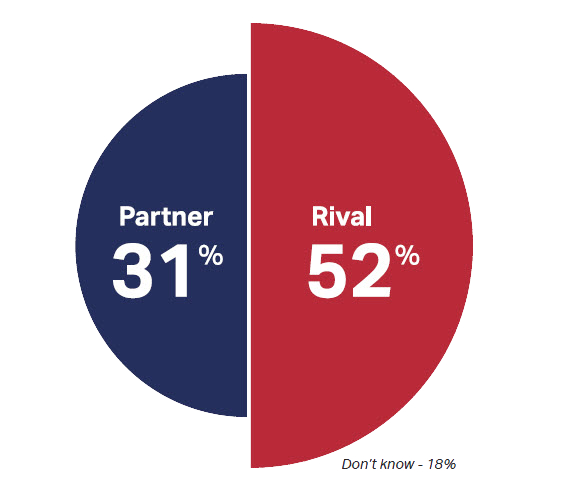
In Canada, the U.S., Germany, and the UK, younger respondents hold a remarkably cooperative view on their country’s relationship with China. While the perception of China as a partner prevails among two out of five (42%) Canadians and Germans aged between 18 and 24, this is not even the case for one-third of the entire public (27% in Canada, 28% in Germany). This generational trend is also found in the U.S. and the UK: A quarter of young respondents in the U.S. (25%) and UK (29%) consider China as a partner, an increased percentage compared to the national average (15% in the U.S., 20% in the UK). Furthermore, a similar pattern can be found among 18-24 year-old respondents in France: Although their views regarding China as a partner do not significantly differ from other age groups, half of the respondents in this age group consider China a rival (52%), compared to almost two-thirds (62%) of the French national average.
Besides the generational divide, there is a high level of homogeneity in public opinion on bilateral relations with China. Across countries, neither income, location, nor employment have a significant effect on how respondents perceive their country’s relationship with China.
SPOTLIGHT
Men are more likely than their female compatriots to consider China as a rival, with the most important gender gap regarding these perceptions found among British respondents (73% of men compared to 49% of women).
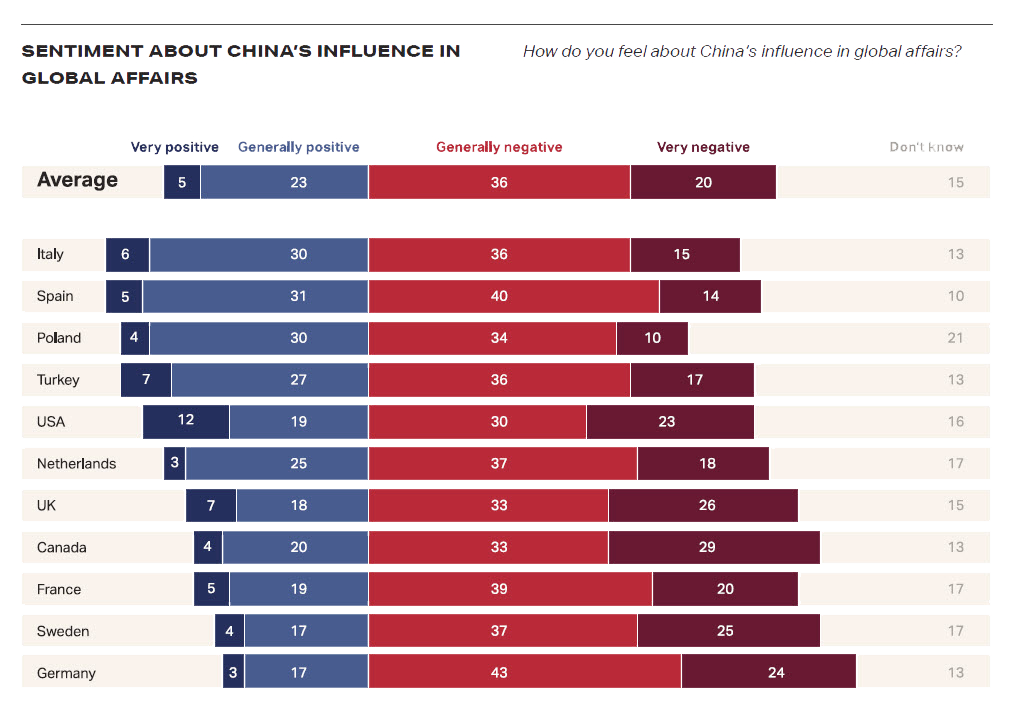
SHOULD YOUR COUNTRY TAKE A TOUGHER OR SOFTER APPROACH TO CHINA?
Respondents in all countries show strong support for a tougher stance toward China—especially on human rights, climate change, and cybersecurity.
The debate whether governments should adopt a harsher stance toward China has become increasingly important in the public sphere on both sides of the Atlantic over the last year. Across all countries surveyed, there is an overwhelming consensus that their governments should adopt a tougher stance vis-à-vis China when it comes to protection of human rights, cybersecurity, and climate change. On trade and technological innovation, majorities are in favor of either maintaining the current state of affairs or getting tougher with China. In France, the support for a tougher attitude toward China is above cross-country average in all domains, whereas a plurality of Turkish respondents favor maintaining the status quo on most issues. But even in Turkey at least one in five want a more robust approach across all issues. In all countries, support for a tougher stance toward China is lowest on technological innovation.
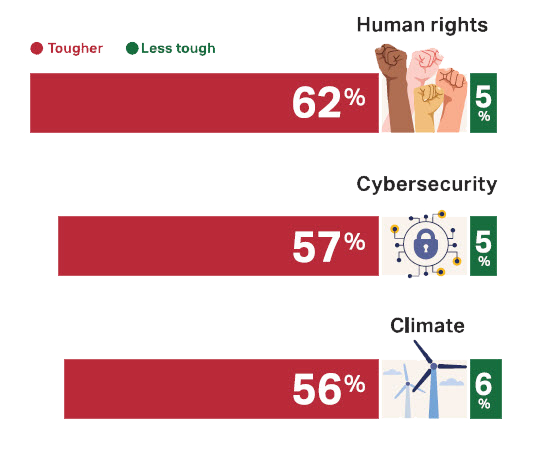
In all countries, a majority of respondents think that governments should adopt a tougher stance toward China on human rights, albeit with important variation: While roughly two out of five respondents in Turkey (44%) share this view, this is the case for 69% of the Swedish and German respondents. Likewise, there are some important transatlantic differences in public opinion: Although EU and U.S. governments have repeatedly confirmed their willingness to cooperate both on climate change and on China, the opinions of the European and American public on their preferred approach toward China in the domain of climate change diverge strongly. Roughly two out of three respondents in France, Sweden (each 65%), Germany (63%), Spain (64%), and Italy (60%) are in favor of their governments adopting a tougher attitude vis-à-vis China, whereas this is only the case for 46% of American respondents. It is striking that the youngest respondents (18-24 yearolds) are much less supportive of a tougher attitude toward China on cybersecurity than respondents older than 55 years, for instance in Canada (40% vs. 77%), Germany (49% vs. 73%), or Poland (46% vs. 72%).
Compared to the results of the survey conducted in May 2020 French, German, and American support for a tougher stance on China has significantly risen across all policy fields. On subjects of cybersecurity and technological innovation, support for a tougher approach vis-à-vis China increased by more than 10 points in all three countries.
SPOTLIGHT
Across policy areas, France scores above average in terms of support for a tougher stance on China. This is most striking on the subject of trade, where 56% of French respondents compared to 39% of respondents across countries—a difference of 17 points—want a tougher stance, followed by climate change (+9 points) and technological innovation (+8 points). Overall, Germans and French are closely aligned on a tougher approach, leading the call in four of the six issues and close behind Americans in also wanting a more robust approach on technological innovation.
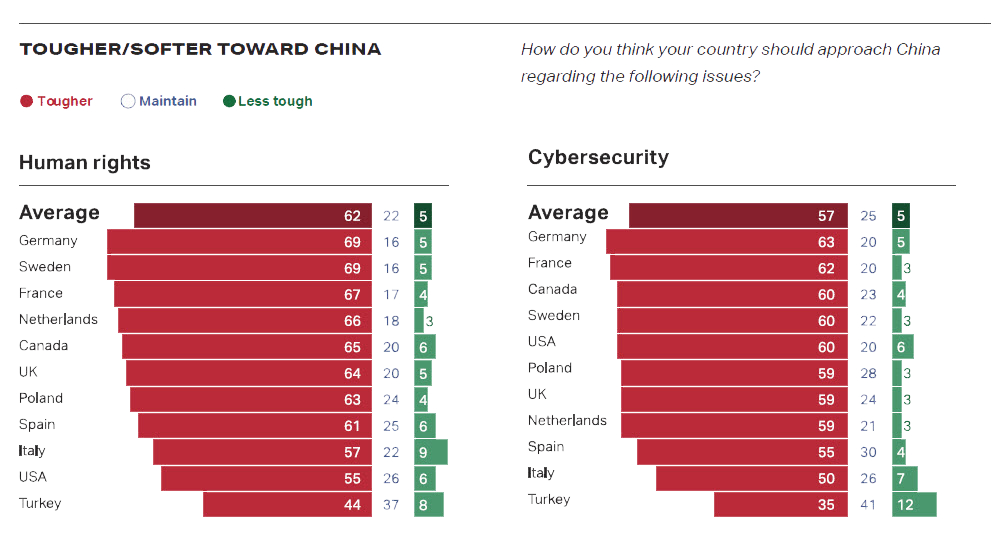
IS TRANSATLANTIC TECH COOPERATION AN EFFECTIVE WAY TO COMPETE WITH CHINA?
Closer transatlantic cooperation on technological issues is overall considered an effective way to compete with China in all countries except Turkey, where an overwhelming majority did not have an opinion about this topic.
China has emerged as one of the world’s tech champions. Whether the development of high-end IT hardware or digital infrastructure in Europe, Chinese companies— and with them often the Chinese government—are major global players. Though the idea is older than his presidency, President Joe Biden’s administration has emphasized the need for democracies to work together to compete with China on tech. Citizens on both sides of the Atlantic seem to agree, with more than two-thirds agreeing that cooperation will help or somewhat help the allies stay competitive. Especially in Spain (67%) and Sweden (66%), respondents deem transatlantic cooperation on technology to be an at least somewhat effective way to compete with China. More than half of respondents everywhere except Turkey think cooperation will help allies compete; in France, Poland, the United States, the UK, and Germany that proportion is 58- 62 percent. In Turkey, more than half of respondents did not know how to answer the question.
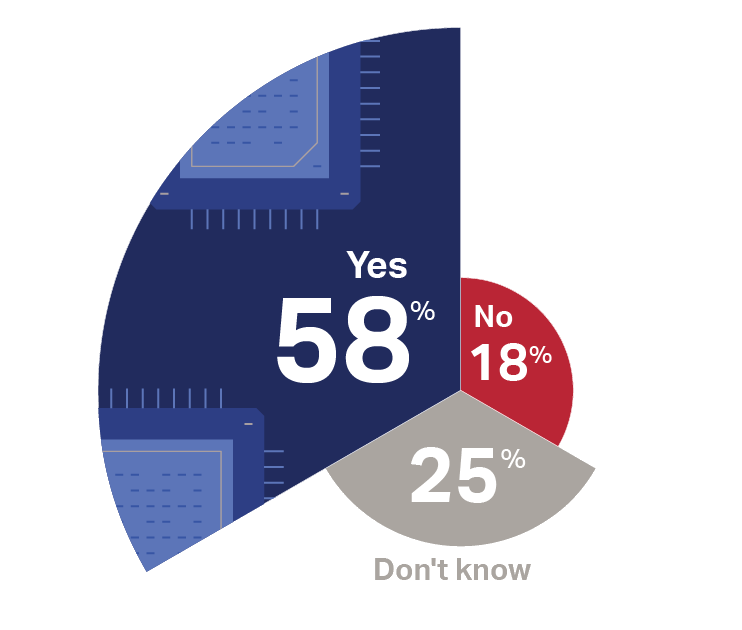
There is no clear political orientation that can be linked to a favorable view on transatlantic cooperation on technology across countries. Support is higher among Democratleaning (68%) than Republican-leaning Americans (58%), and French and Polish respondents aligned with the current governing parties (72% among supporters of La République en Marche, 76% among supporter of PiS in Poland). In other countries, German Greens (76%), and Italians supporting the right-wing conservative Fratelli d’Italia (64%) are confident that transatlantic cooperation on technological issues is the way to compete with China.
As one of the more specific and complicated questions asked, it is perhaps to be expected that a higher number of respondents do not have an opinion on this question. Roughly one out of four respondents in Canada (27%), the United States, the UK, and the Netherlands (each 26%) say they do not know whether technological cooperation is an effective way to compete with China. “Don’t know” responses are particularly high in Turkey (60%), and consistent across age, gender, region, and income. The only exception are respondents who support the governing AKP, of whom 46% compared to 27% of Turks overall—support stronger transatlantic cooperation as an effective way to counter China fully or to some extent. This could align with the results in the United States, France, and Poland, indicating that the supporters of the party in government have been picking up on their leaders’ increasing emphasis on the issue of tech cooperation to compete with China.
SPOTLIGHT
Across countries, men are more likely than women to support transatlantic cooperation on technological issues to compete with China. The Dutch have the largest gender gap: While more than two-thirds of all male respondents (70%) think cooperation will be an effective counter, not even half of all female respondents do (46%).
